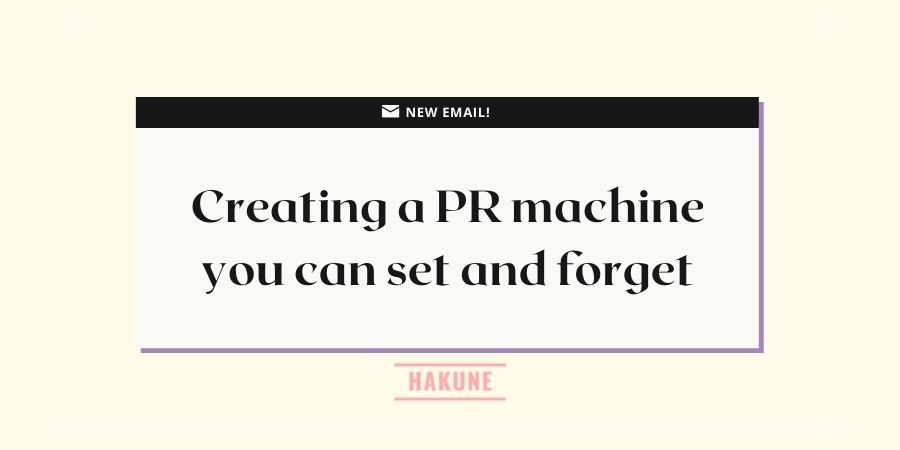The Method Episode #26

Building Your Set And Forget PR Machine
PR’s a roll of the dice that my entrepreneurial inner gambler loves.
When PR hits, it usually does in a big way.
Vxt, who we profiled a few months back, turned a $1,000 PR investment into a $600k capital raise.
Good Good, a local burger joint, doubled their sales overnight after getting profiled in their local rag.
K&J Growth (my agency) landed way bigger clients after word got out that we managed a campaign for TikTok.
All we’re doing here is borrowing credibility from others to increase our trustworthiness. “If the newspaper says their burgers are good, they must be“. “If Tiktok hired them to run a marketing campaign, we’d be silly not to“. Oddly but beneficially, now we (K&J Growth) often get referred to as the agency that worked for TikTok.
The problem is P.R. takes work, and the payoff is random. So this week, I’ve been testing a new way to generate P.R. that I can set and forget.
Here’s how it works
1. Building my hitlist
To get P.R. placements, you need the contact info of journalists, podcasters, and fan pages.
So first, I created a list of articles and podcasts that cover topics in my niche.
For me, that’s ‘Digital Marketing’ ‘Web 3 Marketing’ and ‘Growth Hacking’. Rather than just ‘Marketing’ or ‘Entrepreneurship.’
You can find these articles on BuzzSumo, or hire a virtual assistant to find podcasts from iTunes and Spotify.
I pulled all this info into an excel sheet.
2. Collecting Journalist Contact Info
Next, I downloaded Hunter.io and had this tool visit the URLs of the articles and podcasts from my excel sheet and collect the contact information of the journalists and podcasters.
3. Marketing To These Journalists
Then I created a custom audience on Facebook using my list of email addresses collected by Hunter.io.
Finally, I created a marketing campaign for this custom audience using my past P.R. mentions in carousel ads to get their attention.
It’s early days, but I’m hoping these journalists and podcasters see my ads, read my old P.R. and reach out to me for stories and podcast appearances.
Key Takeaways: You earn P.R. by having a good story that others want to share. I’ve been in business for five years and have done things that others want to talk about.
P.S. If you know any journalists or podcasts that might want to chat – I’d appreciate the nudge.

Dangling The Carrot Or Getting People To Want The Same Outcome
Work gets a little tense when you’re putting together a project with 32 stakeholders across two publicly traded companies and a private entity.
As you can imagine, there are big egos with even bigger chequebooks sitting at the table. And getting those people to want to work towards a common goal is tricky, especially when the project is getting a ton of media coverage and public interest.
I used to think negotiating flat dinners was tough – this is a whole ‘another level.
But the solution is always the same. It’s called finding the carrot.
In the best-selling negotiation book Getting to yes by Roger Fisher, they recommend two approaches.
• Separate the people from the problem.
• Focus on interests, not positions.
Once I’ve found the common problem (or, in this case, outcome) and discovered what each stakeholder wants to achieve here. I can help them focus on a mutually beneficial outcome, I.e. The carrot.
Key Takeaway: Size doesn’t matter. Understand personal interests to find a common goal.
“In the great non zero sum games of history, if you’re part of the problem, then you’ll likely be a victim of the solution.”
~ Robert Wright
Where We’re Learning
• Innovation Framework -> Why innovators start as imitators.
• Story Telling On Social Media-> How Vayner Media tells stories that move you.

Playing To Your Strengths
At school, we’re taught to fix our weaknesses.
‘Your maths is coming along nicely, but you need to buckle down on your English this year.’
But the real world doesn’t care about your weaknesses; it pays you for your strengths.
Before she was presented with her three Olympic Gold Medals in Tokyo, Lisa Carrington wasn’t asked to sing a verse from Johnny Cash’s I walk the line. No, we only cared about how fast she could move her Kayak.
Sure there are scenarios where fixing a weakness is worthwhile, like improving your driving skills. But for anything else (that isn’t life-threatening), I wouldn’t bother.
We seem so shocked as a society when someone who has achieved greatness in one area is seriously flawed in another – especially when it’s behavioural. But that’s precisely why they are great. They invest soo much into their strengths.
Most of our weaknesses are going to stay that way. If we suck at singing, we’re going to keep sucking. If you aren’t funny, well, you probably never will be.
The harsh reality is most of your weaknesses will never become strengths.
Beyond a basic level of core competence that helps you partake in society, you’ll be far better off identifying your strengths and going all-in on them. This is where you’ll naturally out-compete and win.


